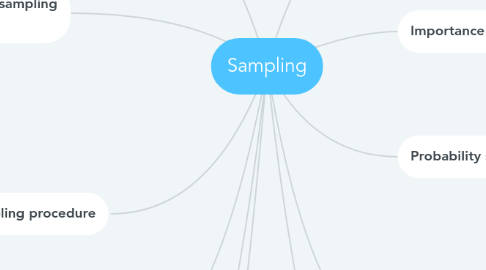Sampling
by Nor Dina

1. Finite and infinite sampling
2. Factor that affect sampling activity
2.1. Purpose of the inspection
2.2. Nature of the product
2.3. Nature of the test method
2.4. Nature of the population being investigate
2.5. Rules and regulation
2.6. Availability of analysis
3. Sampling procedure
3.1. Heterogeneous vs Homogeneous
3.2. manual vs continuos
3.3. Probability vs non probability
4. Non probabiliy sampling
4.1. Judgement sampling
4.2. Simple sampling
4.3. Restricted sampling
4.4. Haphazard sampling
4.5. Quota sampling
5. Preparation of sample
5.1. General size reduction
5.2. Grinding
5.3. Enzymatic inactivation
5.4. Lipid protection
5.5. Microbial growth and contamination
6. Sampling defect
6.1. major
6.2. minor
6.3. critical
7. What is sample and sampling
8. Importance of sampling
9. Probability sampling
9.1. Simple random sampling
9.2. Systematic sampling
9.3. Stratified sampling
9.4. Cluster sampling
9.5. Composite sampling
10. Problems in sampling
10.1. Bias
10.2. Identification
10.3. Storage
11. Types of sampling
11.1. Single
11.2. Double
11.3. Multiple


